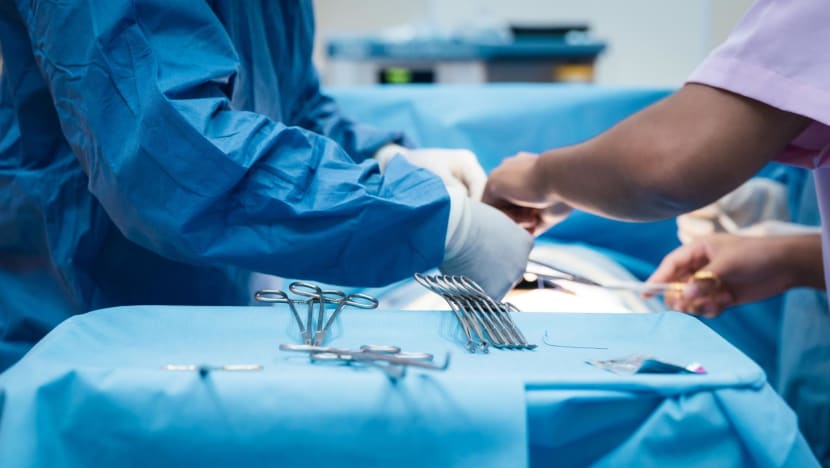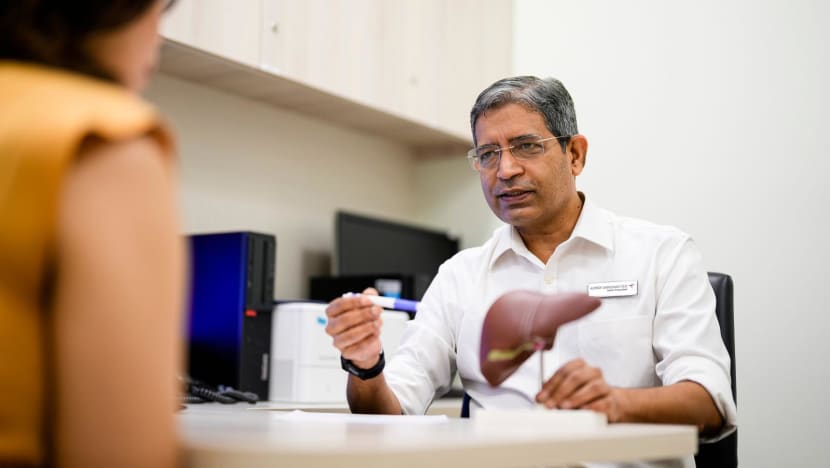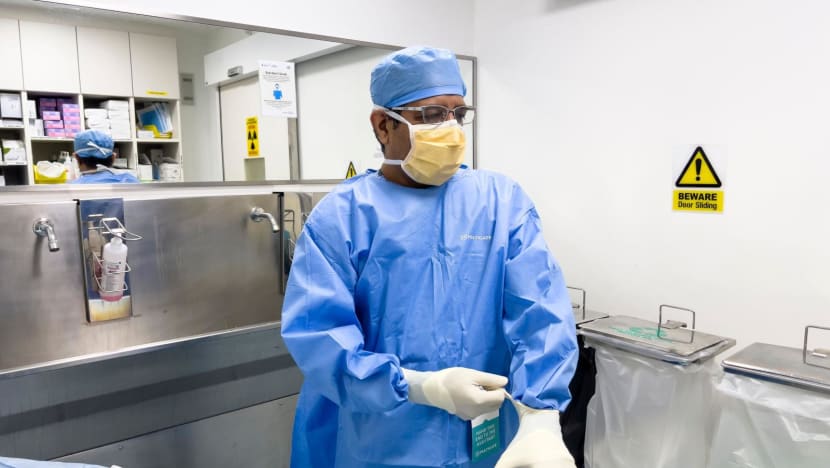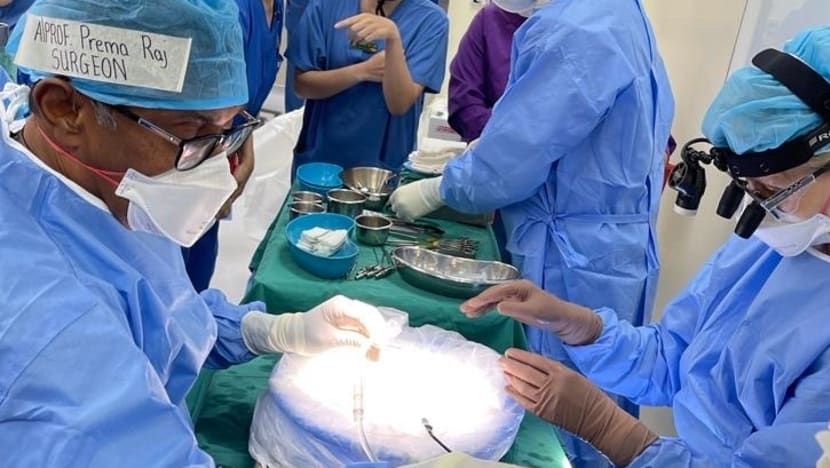'Doesn't get easy': Organ transplant surgeons on the highs and lows of giving others a second chance at life
These are the stories behind what one doctor calls the "greatest gift" and the "ultimate act of kindness".

In light of World Transplant Day, two liver transplant surgeons share the story behind giving others a second at life. (Photo: iStock/TwilightShow)

This audio is generated by an AI tool.
SINGAPORE: The man, newly married and with a child on the way, was severely ill and in need of a liver.
His younger brother stepped up, but doctors were worried that he might share an inherited medical condition with the patient, recalled Associate Professor Jeyaraj Prema Raj, a liver transplant surgeon at the Singapore General Hospital (SGH).
And the part of the liver to be donated first had to be tested in the United States for transplantation suitability – and during this time, the patient's condition worsened.
He was in a "grey area" where doctors have mixed feelings about doing a transplant simply because the patient is too ill, said Assoc Prof Prema Raj, the hospital's senior consultant of hepato-pancreato-biliary and transplant surgery.
But the patient’s family wanted the transplant to happen.
So a team of about 20 doctors conferred and concluded that they would go ahead.
The operation was a success, and the patient lived to see the birth of his child.
"It was the most incredible thing," said Assoc Prof Prema Raj. "The whole team felt it because we took that risk. We didn't just give up on him."

A WAITING LIST FOR ORGANS
In Singapore, a mother's decision to donate the organs of her brain dead 14-year-old child made headlines in late May.
The boy, identified as secondary school student Isaac Loo, had collapsed during a 2.4km run, according to local reports.
While his mother was initially hesitant, she ultimately went ahead after being told there were hundreds of people on a waiting list.
As of last December, there are more than 500 patients on the national waiting list, said the National Organ Transplant Unit (NOTU) and Ministry of Health (MOH) in response to CNA’s queries.
The waiting time depends on various factors and is largely due to a "small pool of eventual deceased organ donors, as not all deceased patients are clinically suitable to proceed with organ donation", they added.
The potential donor must be assessed to be medically suitable and with a recipient match, said NOTU and MOH.
This week also marked World Transplant Day on Jun 6, an annual reminder of the thousands of people around the world who are alive due to transplantation.
In Singapore, the Human Organ Transplant Act or HOTA allows the heart, liver, kidneys and cornea from deceased Singaporeans and permanent residents aged 21 and above to be donated for transplantation, unless they have opted out.
Over the last ten years, the opt-out rate for HOTA has remained at around three per cent of the population, NOTU and MOH added.
The deceased organ transplant rates in Singapore for kidney, liver and heart were 6.59, 3.89 and 0.85 per million population respectively last year.
Those aged 18 and above can also pledge their organs, tissues and entire body for transplantation, treatment, education or research after death under an opt-in scheme known as the Medical (Therapy, Education and Research) Act (MTERA).
If someone has not pledged their organs under MTERA before passing away, or was under 18 years old, the adult next-of-kin can give consent for donation on their behalf.
HOW TRANSPLANTS HAPPEN
Organ transplants can be done from donors both living and deceased - those who have been certified as brain dead.
In the latter case, surgeons could be called up at any time of the day - mostly during odd hours - when an organ becomes available.
At times, doctors might get a heads-up that a potential donor at an intensive care unit is being tested for brain death.
Surgeons look at details such as blood group, age, weight and medical history to see if there's a match with a recipient on the waiting list.
The organ is then retrieved from the donor. When the organ has received the green light for transplantation, a separate team will assess the recipient for any active infection or fever, and start the surgery soon after.
A liver transplant operation can take about six to eight hours, and more complicated cases can go on for as long as 22 hours.
Once retrieved, an organ can be stored for about 12 hours and must be used within this period.

EMOTIONAL ROLLERCOASTER
Transplant surgeons who have performed hundreds of procedures over decades told CNA that the job "doesn't get easy" with time.
"There is never a situation where you don't feel sorry when you hear the stories that come with the donations," said the National University Hospital's (NUH) Associate Professor Shridhar Iyer.
Performing an organ transplant is also a lesson in "humility because you cannot be any greater than somebody who's making the sacrifices", he added.
The co-director at the hospital's National University Centre for Organ Transplantation pointed out that every organ donor can potentially save five lives with their heart, lungs, two kidneys and a liver.
A liver can also be split between an adult and a child, saving even more lives.
Sometimes, resistance from family members can prove to be an obstacle.
"That makes it very painful for me, knowing that the loved ones have concerns and reservations," said Assoc Prof Shridhar.
"Most transplant surgeons shouldn't be told about the conflicts that have happened before, because then it makes it difficult emotionally to go and retrieve the organ."

Assoc Prof Shridhar noted the case of Isaac Loo, calling it a "hugely brave" act by his mother.
He has retrieved organs from children, though such cases are "far and few", and can be "excruciatingly painful" to think about.
"But ... there is another child who's going to get a gift of life; somebody else will get a chance to live and the organs will not go to waste - that gives us the energy to carry on," he added.
SGH’s Assoc Prof Prema Raj, who also heads the SingHealth Duke-NUS Transplant Centre, said organ transplant surgeons have a role to play in "making sense" of a loss of a life.
Organ donation, he said, is "the greatest gift that one person can give to another".
"(A) liver or heart beats in someone else and it’s such a wonderful thing," said the surgeon.
"It is the ultimate human act of kindness."


















